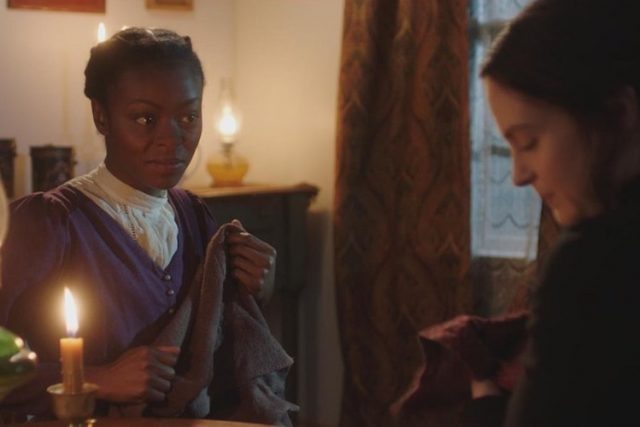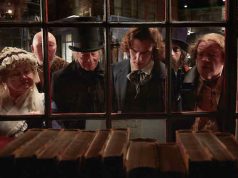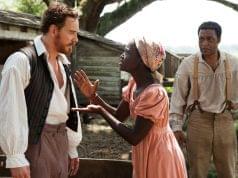
Members of The Church of Jesus Christ of Latter-day Saints (or MOTCOJCOLDS for short) know Emma Hale Smith, wife of the Prophet Joseph Smith, as a loving spouse who put up with a lot of garbage. Long before her husband was murdered in 1844, she endured the deaths of some of her children, was forced out of one home after another, and had to contend with the then-secret practice of polygamy. It wasn’t enough that she had to share her husband with the whole church — she had to share him with other women, too.
MOTCOJCOLDS are less familiar with Emma’s friend Jane Manning, one of the early church’s few black members at a time when even good-hearted saints were often hella racist. “Jane and Emma,” an engrossing historical drama set just before and after Joseph’s death, paints an inspiring portrait of two strong women who refuse to let go of their faith, but who also refuse to ignore the elements of their religion that make it difficult for people like them to stay. Directed by first-timer Chantelle Squires from a screenplay by Latter-day Saint author Melissa Leilani Larson, this is the rare film that’s spiritually uplifting without glossing over the hard parts.
 In the story’s “present,” Jane (Danielle Deadwyler) returns to Nauvoo, Ill., after a brief absence to comfort Emma (Emily Goss) the day after Joseph’s martyrdom. The grief-stricken widow has sent all other mourners away, overwhelmed by their number and intensity, but she welcomes Jane, whom she considers a kindred spirit and fellow-sufferer. Emma is watching over Joseph’s body in case the mob that killed him (or another one; there’s no shortage of mobs) comes to take it. When well-meaning but perhaps insensitive church elders offer to take charge of the body — oh, and set up a public viewing, too — Emma dismisses them curtly. When a man asks whether she can protect herself if a mob descends on the house, Emma replies with action-heroine steeliness: “You’d be surprised, I think, at the things God gives me strength to do.” Buddy, you have no idea what this lady is capable of.
In the story’s “present,” Jane (Danielle Deadwyler) returns to Nauvoo, Ill., after a brief absence to comfort Emma (Emily Goss) the day after Joseph’s martyrdom. The grief-stricken widow has sent all other mourners away, overwhelmed by their number and intensity, but she welcomes Jane, whom she considers a kindred spirit and fellow-sufferer. Emma is watching over Joseph’s body in case the mob that killed him (or another one; there’s no shortage of mobs) comes to take it. When well-meaning but perhaps insensitive church elders offer to take charge of the body — oh, and set up a public viewing, too — Emma dismisses them curtly. When a man asks whether she can protect herself if a mob descends on the house, Emma replies with action-heroine steeliness: “You’d be surprised, I think, at the things God gives me strength to do.” Buddy, you have no idea what this lady is capable of.
Flashbacks show Jane’s arrival in Nauvoo a year earlier, accompanied by several family members, all of whom walked to Illinois after being converted in Connecticut. The magnetic Joseph (Brad Schmidt) welcomes them, impressed by Jane’s spiritual insight and visions, and she takes a job at Joseph and Emma’s boarding house.
As the film toggles between 1843 and 1844, Jane and Emma’s sisterly bond is shown to be the product of the two elephants in the room: polygamy and racism. As the wife of the church’s top leader, Emma is constantly in the spotlight, constantly being judged, and has had to share the man she loves romantically with all the people who love him spiritually — and, thanks to polygamy, with some who love him romantically as well. As one of only a few black Mormon women, Jane must contend with her fellow saints’ racist attitudes, which sadly aren’t much different from those of the average American at the time. Both women are marginalized by the very community that was supposed to embrace them, that was supposed to embrace everyone. Joseph firmly rebukes one man’s race-oriented “doctrine” as false, but history shows that those beliefs found their way into official church policies after Joseph’s death, and stayed for more than a century. Joseph clearly loves Emma, but his practice of plural marriage, even if it was commanded by the Lord, is deeply humiliating to her. (In public, Emma went to her grave denying that Joseph was ever a polygamist.)
I’d like to see a movie someday focused entirely on Emma Smith’s life, but this one has the narrower scope of exploring her friendship with Jane, who emerges as a pragmatic, not-to-be-messed-with source of comfort and wisdom. Danielle Deadwyler, whose most prominent role before this was on Tyler Perry’s Oprah Winfrey Network soap opera “The Haves and the Have Nots,” brings rich, soulful nuance to the character of Jane Manning as she fights to maintain the inner peace the gospel brings her. It’s unfortunate that Emily Goss’ performance as Emma, while fitfully convincing and sometimes even powerful, lacks the strength and energy of Deadwyler’s. Their many scenes together are often imbalanced for this reason.
Larson’s tight screenplay (which assumes some familiarity with but not necessarily adherence to the LDS faith) has the two women asking tough questions about their faith, their religion, and their faith in their religion, but it never paints either of them as wholly one thing or another. Both women are flawed, and so is Joseph. Emma, who left the church after Joseph’s death and didn’t trek to Utah with Brigham Young and the pioneers, has been the subject of much character assassination by judgmental Latter-day Saints (then and now), but “Jane and Emma” doesn’t perpetuate that. It does, however, show how similar people can follow different paths when their faith is tested, reminding us to be grateful if our own tests haven’t been as agonizing.
B (1 hr., 30 min.; )




